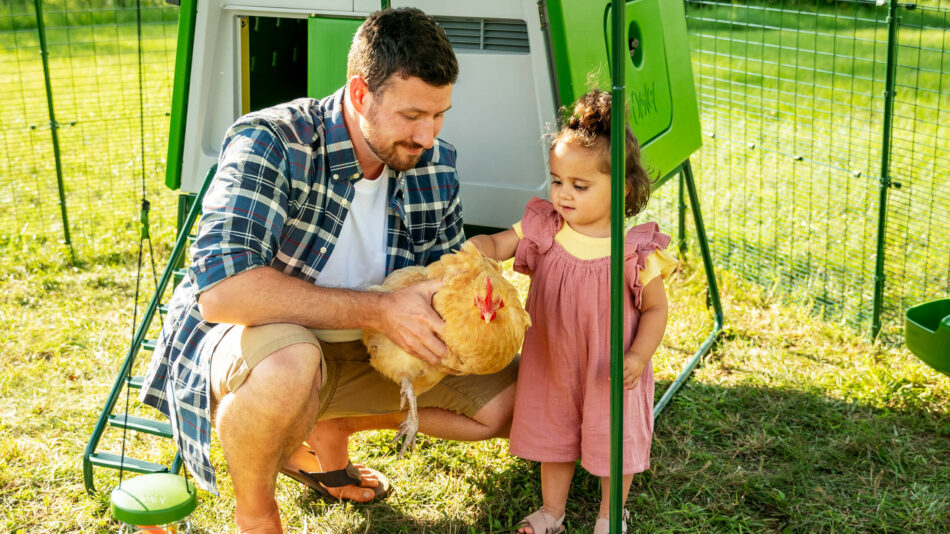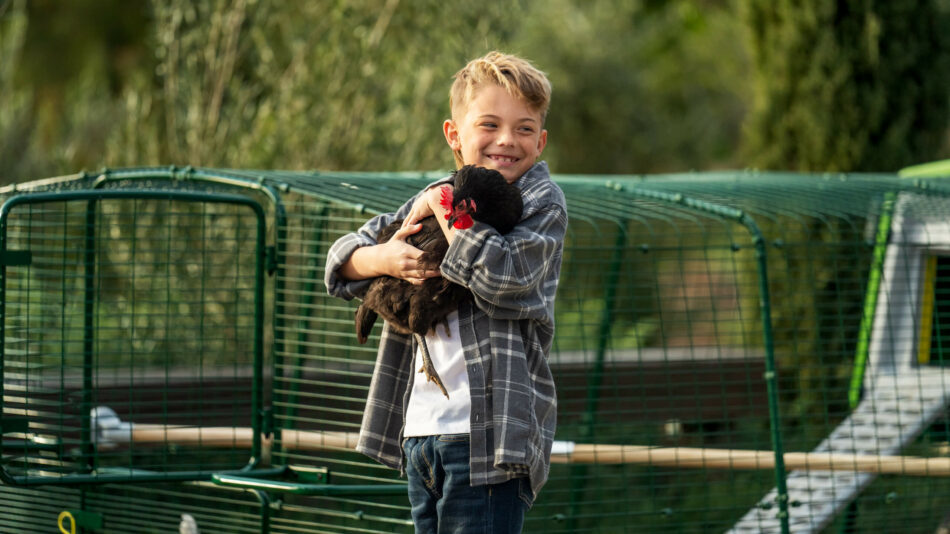Why chickens make the best pets for kids
There are several reasons why chickens make the best pets for kids. From teaching responsibility, to learning where food comes from, backyard chickens can provide children with valuable life skills and lessons that can’t be replicated by other pets. Discover how adding a flock of hens to your family will broaden the minds of children of all ages, and give them a deeper understanding and appreciation of the wonderful world around them.
Daily chicken care teaches responsibility
Chickens are fairly self-sufficient pets, but they still require some daily care. These tasks are perfect for the young members of your family, and will teach your kids the value and satisfaction of a job well done. The reliance a flock has on their keepers also reinforces the concepts of responsibility and integrity.
Feeding and watering chickens
Feeding chickens is fast and simple, and can be a fun childhood chore. Let your kids measure out chicken feed to add to the flock’s feeder, and allow them to toss chicken scratch as a treat. Chicken waterers can be filled with a garden hose or watering can, which may be a task best suited for older children.
Collecting eggs
Gathering eggs is a favorite activity for adults and children alike. Make sure your hens’ nesting boxes are easy for your children to access, and teach them how to handle eggs carefully to avoid drops or cracks. Let your kids choose their own or decorate an egg collecting basket to personalize their experience.
Cleaning the chicken coop
An easy to clean chicken coop is a necessity for chicken keepers of all ages, but having a plastic chicken coop that can be sprayed and wiped clean in minutes allows children to get in on the cleaning action. Chicken coops like the Eglu Pro have removable droppings and nesting box trays for easy cleaning, so your children can clean designated coop components during each cleaning session. The sparkling clean results are an instant reward for your children’s efforts.
Opening and closing the chicken coop
Securing chickens at night is a big responsibility, so this should be left to older children — but opening the coop in the morning may be the perfect way for younger children to start their day. Or, if you’re looking to introduce your children to innovative products that streamline tasks, the Smart Autodoor can be accessed and operated via a mobile app from anywhere in the world. Help your children understand the importance of and how to determine your flock’s schedule by talking about time, amount of daylight, and the potential for predators at dawn and dusk.
Handling chickens teaches gentleness and patience
Chickens aren’t hatched with an innate tolerance of being handled. Handling chickens requires gentleness and patience, both of which are excellent lessons for kids to learn and put into practice. If you’re starting with chicks, make sure children understand that chicks are fragile, and if squeezed or dropped may sustain injuries. Regular interaction will help chicks grow accustomed to their young owners, and will build confidence in your children’s chicken-handling abilities.
Fresh eggs are perfect for beginner culinary creations
Children of all ages can learn how eggs incorporate into different dishes and meals. Young children can crack fresh eggs for scrambled egg breakfasts, while older children can crack them into cake or cookie recipes. For budding chefs, you can help your child try their hand at poached eggs or a frittata, or master the art of making the perfect meringue.
Appreciation for where food comes from
Many children don’t have the opportunity to see where their food comes from. But thanks to the possibility of keeping chickens in even an urban backyard, kids can be exposed to the process of egg production. Teaching children the biological process of laying eggs, the supply and demand of food, and how nutrition benefits the production of hens are all valuable lessons that can be observed in a backyard flock. You can also show your children how to store fresh eggs to reduce waste or to prepare for the lack of eggs during your chickens’ annual molt.
Relaxing backyard companionship
Unless you’ve witnessed it yourself, it’s hard to describe the serenity that comes from watching chickens peck the ground. Children aren’t exempt from this phenomenon, and it’s a sight to behold when your child is happily playing in the backyard surrounded by a flock of gently clucking hens. Your flock will help control pests in your backyard, making it more enjoyable for your children to play in the grass, while also providing calm companionship while your kids play. Have your children bring fresh fruits or vegetables to the flock and watch them become the instant favorite. Children of all ages can delight in hand feeding their hens fresh, nutritious treats.
Chicken handling hygiene
Always teach your children hygienic chicken handling techniques. When interacting with chickens, keep the following in mind:
- Always wash your hands and teach your children to wash their hands thoroughly after handling eggs, chicks, or chickens, or after cleaning the coop.
- Don’t allow your children to kiss their chicks or chickens. We know it’s tempting, but this well-intended gesture is not worth the risk of illness.
- Contact your veterinarian right away if any of your chickens appear sick.
Omlet, your children, and your flock
As a parent, you want what’s best for your children. And as chicken experts, we design what’s best for flocks and their caretakers — no matter their age. Our chicken coops are easy to access and clean, and our Walk In Chicken Run features stable-style doors for convenient access. And to help your busy schedule, our Smart Autodoor offers automation for your flock’s schedule, without losing the lesson of the importance of securing chickens in their coop overnight. Discover how fun and easy chicken keeping can be, and learn all about these amazing animals along with your children. With Omlet, flock raising can be a truly enjoyable family endeavor.
This entry was posted in Chickens


